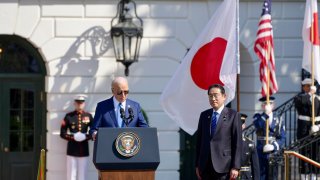On U.S. Steel, America Must Not Take Our Allies For Granted
Both President Joe Biden and Vice President Kamala Harris oppose a landmark deal that will enhance U.S.-Japanese ties and launch foreign investment in the United States.
The proposed $14.9 billion merger between U.S. Steel and Nippon Steel has sparked a heated debate in Washington. As someone who has spent a significant portion of my career fostering U.S.-East Asia relations, I find the opposition to this deal on national security grounds frankly difficult to understand. It is not only hypocritical and inconsistent with our long-standing alliance with Japan, but there are no national security concerns that can serve as legitimate reasons to reject this deal.
For seventy-two years and running, Japan has been one of America’s oldest and most trusted allies. President Biden himself has repeatedly emphasized the strength of this relationship. In a joint statement with Prime Minister Kishida Fumio, Biden declared, “The U.S.-Japan Alliance has reached unprecedented heights. Our nations, individually and together, took courageous steps to strengthen our collective capacity in ways that would have seemed impossible just a few years ago.”
This sentiment was echoed by senior administration officials who have consistently highlighted Japan’s critical role in the region. Most notably, Democratic presidential nominee and Vice President Kamala Harris said during her trip to Tokyo in September 2022 that our alliance with Japan is “a cornerstone of what we believe is integral to peace, stability, and prosperity in the Indo-Pacific region.”
And now, both President Biden and Vice President Harris both publicly oppose Nippon’s acquisition of U.S. Steel, presumably due to strong objections from organized labor. The timing can’t be coincidental.
Moreover, the opposition to this deal contradicts the administration’s own position towards Japan, which has long been seen as a central component to countering China’s increasing global reach. For instance, in an effort to repel cybersecurity risks from China, the Biden administration said in February that it plans to replace Chinese-made cranes in U.S. ports with Japanese-made ones—yet it refuses to let a Japanese company invest billions in our economy. How does that make sense?
The Biden administration has been vocal about the need to strengthen alliances and partnerships to counter global challenges. Blocking this merger sends a conflicting message to our allies, suggesting that our commitment to economic cooperation is conditional and subject to change based on domestic political pressures. President Biden’s post-inauguration calls for “reaffirming and revitalizing” America’s alliances now ring particularly hollow.
Given this context, the decision to block the merger on national security grounds appears disingenuous. Nippon Steel has committed to maintaining and potentially increasing domestic manufacturing capacity in the United States by promising to invest $2.7 billion in our steel industry. This investment would enhance supply chain and overall economic security, a critical facet of America’s national security today. Furthermore, this deal would create the third-largest steelmaker in the world that can counter China’s predatory behavior in this global industry and beyond.
The argument that this merger poses a national security risk is unfounded. Nippon Steel is not a state-owned enterprise like Chinese steelmakers. All it wants to do is do business with America, its most trusted partner. By blocking this deal, we risk alienating a key ally and undermining the principles of free trade and open markets that we advocate on the global stage. Why should we discourage other like-minded countries from investing in the United States and American workers?
And we are not as far as we would like to think from souring our relations with Tokyo. Shigeru Ishiba, Japan’s former defense minister and a potential front-runner to become its next prime minister, said in an interview, “I find what the United States is saying (about Nippon Steel) to be very unsettling, making such statements or actions that could undermine the trust of its allies. Recently, the United States is tending to impose deals and threats even on its allies, this is true not only with NATO countries but also now with Japan. I question whether that is really a fair approach.”
Moreover, Japan’s digital minister and former defense minister, Taro Kano, also said, “We all believed that the U.S. has a market oriented economy and Japan and the U.S. are good allies and I didn’t see any economic or security threat involved in this takeover.”
Time and time again, we must remind ourselves not to take our allies for granted, and blocking this deal does exactly that. It undermines our credibility as a reliable partner and sends a troubling signal to our allies. If we are serious about maintaining our leadership role in the Indo-Pacific and beyond, we must align our actions with our words. And that starts with not looking for unjustifiable excuses in the national security arena to oppose the merger of U.S. Steel and Nippon Steel.
It would be interesting to be a fly on the wall as President Biden tries to explain this to Prime Minister Kishida at the upcoming Quad Leaders’ Summit in Delaware later in September. I am confident that other leaders would also be alarmed, as this bad policy decision serves as a dangerous precedent for how America treats our allies around the world.
Heino Klinck was the Deputy Assistant Secretary of Defense for East Asia, 2019–21, with responsibility for bilateral defense relations with Japan.
Image: Andrew Leyden / Shutterstock.com.

